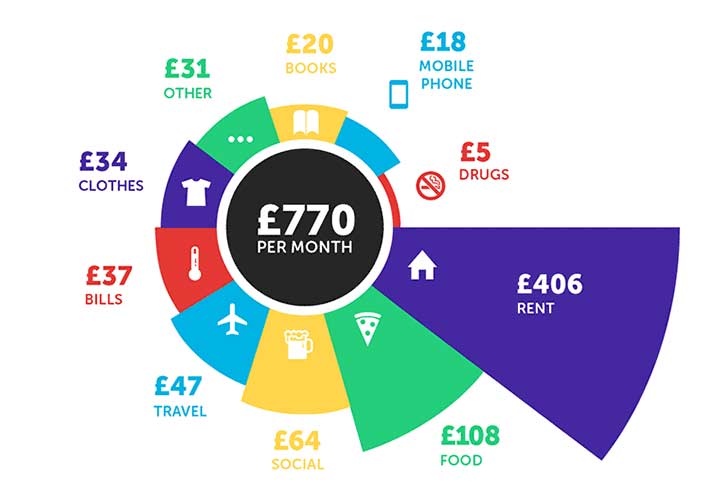Parents cough up £138.50 every month to plug Student Finance gap
University students depend on parents for financial support – but poorer families contribute more than expected, while richer parents give less.

Almost half of university students feel disadvantaged by their household income because of the way Maintenance Loans are calculated.
Our National Student Money Survey 2018 has revealed that the majority of parents have to hand out cash to university students.
The survey, which received 3,167 responses, found that one in three students feel their parents do not give them enough financial support. Students reported that they receive an average of £138.50/month from their parents, amounting to over £1,600/year.
Contrary to some expectations, poorer parents actually over-contribute compared to richer parents. Households with incomes of less than £25,000 a year are not expected to pay anything, yet they give an average of £54/month to children at university.
Male students were also found to receive more than female students, pocketing £161/month from their parents compared to just £135/month for females.
How much do parents contribute?

Credit: DreamWorks Pictures
The Maintenance Loan covers your living costs as a student, and the amount received is worked out against the income of the household in which that student resides.
It means that if you have higher-earning parents, you receive less money from the government, as your parents are expected to provide more financial support to make up the shortfall. If you come from a lower-income background, you can apply for a larger loan, as your household is likely to be less able to contribute.
However, our survey results reveal that the least well-off families over-contribute by an average of £54/month, while those from households bringing in £60,000/year under pay by £160/month.
| Household income | ‘Expected’ monthly contribution* | Average monthly contribution | Under- or over-payment |
|---|---|---|---|
| Less than £25,000 | £0 | £54 | £54 |
| £25,001 - £35,000 | £51 | £89 | £38 |
| £35,001 - £45,000 | £151 | £134 | -£18 |
| £45,001 - £55,000 | £252 | £141 | -£111 |
| £55,001 - £65,000 | £353 | £193 | -£160 |
| £65,001+ | £375 | £287 | -£88 |
*based on the difference between the maximum student loan (living away from home outside London) and what students receive using the midpoint between salary bands.
There is even greater disparity when it comes to where students attend university.
- Parental Contributions Calculator reveals how much your parents are expected to give you
- How to ask parents for money
Students in London who come from households earning less than £25,000/year receive £151/month more from their parents than is expected, while those on salaries between £45,000 and £55,000 underpay by £119/month.
Money received by students living at home also falls short of expectations, with the lowest income families once again forking out £30/month more than expected.
How much does university life cost?
Problems arise because of the simple fact that the average Maintenance Loan is less than the average amount students needs to get by.
The average student living costs are £770/month, while the average amount received by students is £600/month - meaning they're £170 short.
- Plug some of the gap yourself - these deals earn you money and rewards!
- The Big Fat Guide to Student Finance 2018
Even students who receive the maximum loan - which was £8,430 in 2017/18 (for a student living away from home, outside of London) - may be £68 short each month, and their parents might not be able to contribute the difference.
Kami, a student at Ravensbourne University, said:
As my single mother is getting my brother and I through university at the same time, she has no excess money. This means we get by day-to-day.
Opportunities arise at university and always come with great expense, which means only students from wealthy backgrounds benefit from these opportunities (exchange programmes, internships, work placements).
Education seems to be only for the rich when at uni.
On the other end of the spectrum there's Jamie, a first-year at Keele University, who says he's penalised because his family have a decent household income, meaning he gets the minimum loan.
This loan does not even cover my accommodation costs.
It is ridiculous that my parents have to spend £800 of their own money just so I can live on campus (not including the £30/week I get from them for food).
My parents shouldn’t have to be worrying about making it through the month just so I can stay at university.
Reactions to the results

A huge 61% of respondents said they didn’t think Maintenance Loans were big enough. 78% worry about making ends meet, with this rising to 84% among those who don’t receive any money from parents.
Mel, a second-year student at the University of Greenwich, said:
As a student midwife, I’m sometimes on placement 48 hours a week. It is almost impossible to work, study, get enough sleep and socialise on top of this.
My parents can't afford to support my living costs and the money I get from Student Finance (and NHS bursary) only just covers my rent. I have to work to be able to put food on the plate, let alone do anything else.
Jake Butler, Save the Student's student money expert, commented:
When it comes to student loans, the focus always seems to be on the £9,250 tuition fees or the extortionate interest. But the real issue is the insultingly low Maintenance Loans alongside the government’s unwillingness to admit that parents are expected to make up the shortfall.
It’s a huge talking point between students. Are they fully-fledged adults who are expected to fund themselves? Should they be asking their parents for money? Should their parents be forced to help them out?
The government needs to put an end to this confusion by being more explicit about parental contributions, and/or increase the Maintenance Loan amount so that it is actually in line with real living costs.
Ultimately, lack of money and finance worries among students is commonplace. Over half (52%) of survey respondents said Student Finance is unfair, while 27% say that their grades suffer because of money concerns.
Students often turn to alternative sources of income just to fund their living. This includes 5% who admit to gambling to earn extra money, 3% who turn to adult work, and 2% who rely on drug trials.
Finance worries often affect other areas of life too. 46% of students said that their mental health suffered as a result of money troubles, while 50% reported difficulties with being able to eat enough and maintaining a healthy diet.
Do you think it's fair that the government uses household income to decide how large a Maintenance Loan you should receive? Let us know in the comments!









